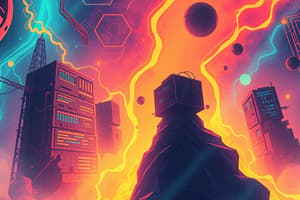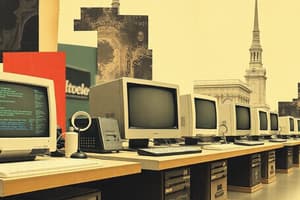Podcast
Questions and Answers
What is the purpose of a computer?
What is the purpose of a computer?
The purpose of a computer is to take data, process it, then output it.
What does a computer system consist of?
What does a computer system consist of?
A computer system consists of hardware and software that work together to process data/complete tasks.
What is hardware?
What is hardware?
Hardware is the physical stuff that makes up your computer system, like the CPU, motherboard, monitor, and printer.
What is software?
What is software?
What are the types of computers?
What are the types of computers?
What is an embedded system?
What is an embedded system?
What are embedded systems used for?
What are embedded systems used for?
Are embedded systems easy to make?
Are embedded systems easy to make?
What are the components of the computer?
What are the components of the computer?
What is the CPU?
What is the CPU?
What does CPU architecture describe?
What does CPU architecture describe?
What are the main parts of the CPU?
What are the main parts of the CPU?
What is the function of the control unit?
What is the function of the control unit?
What does the arithmetic logic unit (ALU) do?
What does the arithmetic logic unit (ALU) do?
What is the cache in the CPU?
What is the cache in the CPU?
What are registers in the CPU?
What are registers in the CPU?
Flashcards are hidden until you start studying
Study Notes
Purpose of a Computer
- Processes data efficiently, performing tasks more effectively than humans.
Components of a Computer System
- Comprises hardware and software that collaboratively process data and execute tasks.
Hardware
- Refers to the tangible components of a computer system: CPU, motherboard, monitor, and printer.
Software
- Consists of programs and applications that the computer runs, such as operating systems and applications like word processors or video games.
Types of Computers
- Includes a variety of systems, from small devices (calculators, watches) to large supercomputers.
- General purpose systems (e.g., PCs, tablets) are designed for multiple tasks while dedicated systems focus on a specific function (e.g., traffic control, aircraft navigation).
Embedded Systems
- Defined as computers integrated into other devices (e.g., microwaves, TVs) and typically function as dedicated systems.
Uses of Embedded Systems
- Function as control systems that monitor and regulate machinery to achieve specified outcomes, such as managing water pumps and cycles in dishwashers.
Design and Production of Embedded Systems
- Generally easier to design, less expensive to produce, and optimized for performance on specific tasks compared to general-purpose computers.
Key Components of a Computer
- Power Supply: Provides energy to hardware components.
- Case Cooling Fan: Expels hot air from the system.
- CPU Heat Sink and Cooling Fan: Maintain CPU temperature.
- CPU: Central processing unit responsible for executing data processing.
- Optical Drive: Reads/writes optical disks.
- RAM Sticks: Temporarily store data for quick access.
- Hard Disk Drive: Serves as internal secondary storage.
- Motherboard: Main circuit board linking all hardware components.
Central Processing Unit (CPU)
- Acts as the brain of the computer, processing data and executing instructions.
- Processing power is determined by characteristics such as clock speed, number of cores, and cache size.
CPU Architecture
- Defines the key components of the CPU and their interactions, including main types: Von Neumann and Harvard architecture.
Main Parts of the CPU
- Comprises three essential components: Control Unit, Arithmetic Logic Unit (ALU), and Cache.
Control Unit
- Oversees the CPU operations and executes program instructions via the fetch-decode-execute cycle.
- Manages data flow within the CPU and to/from the main memory and I/O devices.
Arithmetic Logic Unit (ALU)
- Performs arithmetic calculations (addition, subtraction) and logic operations (AND, OR, NOT).
- Can execute multiplication and division through repeated addition/subtraction.
Cache
- High-speed memory located within the CPU, acting as an intermediary between the CPU and RAM.
- Faster than RAM but has limited capacity and higher cost.
- Different cache levels (L1, L2, L3) with varying speeds and capacities, where L1 is the fastest and smallest.
Registers
- Small, quick storage locations within the CPU hold temporary data necessary for processing, offering rapid read/write capabilities.
Studying That Suits You
Use AI to generate personalized quizzes and flashcards to suit your learning preferences.




